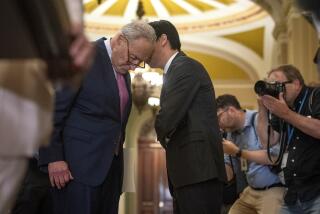Filibuster changes, governors underscore exodus from Washington
- Share via
Events Thursday brought more evidence of why much of the 2014 campaign will feature candidates fleeing, figuratively or literally, from Washington.
In the Senate, supposedly the more collegial of the two houses of Congress, bitterness seethed beneath the veneer of civility as majority Democrats and minority Republicans fought over a filibuster rule that has, depending on the viewpoint, given voice to the outnumbered or contributed mightily to paralysis on things like presidential appointments.
“Can anyone say the Senate is working now? I don’t think so,” said Harry Reid, the Nevada senator and majority leader who edged into country-song territory to lament the “wasted hours and wasted days” caused, he said, by Republican obstructionism.
Minority leader Mitch McConnell of Kentucky angrily accused Reid of trying to change the subject from the failure of the president’s healthcare plan to “cook up some fake fight” over stalled judicial appointees.
PHOTOS: 2013’s memorable political moments
“It only reinforces the narrative of a party that is willing to do and say just about anything to get its way,” he said, neatly encapsulating what Americans believe about both sides.
The vote to change the filibuster rules has long been referred to as the “nuclear option,” a phrase meant to confer its level of seriousness. Pressing the nuclear button, therefore, was the latest sign of the partisanship and rancor that has been acutely evident in the House but occasionally papered over in the upper house by the Senate’s genteel traditions and comparative moderation.
Republican governors, meeting in distant Arizona, took pains to contrast Washington and their statehouses, which they described as the places where things were getting done, according to an account by Real Clear Politics.
“We’re going to run on our record. I’m very proud of that,” said Michigan Gov. Rick Snyder, who faces a stiff reelection fight in 2014. “We said we were going to do these things and we’ve done them largely. Isn’t that what you should want?”
“Government at the national level doesn’t seem to work anymore,” echoed Indiana Gov. Mike Pence, a former member of Congress.
Back in Washington, Vice President Joe Biden, his eye on a potential presidential contest in 2016, took pains to declare his kinship with his home state, Delaware, hardly a political powerhouse but at least not Washington. He showed up at the opening of a Delaware-based Italian sandwich shop to assert his home state’s primacy in all things hoagie.
PHOTOS: The battle over Obamacare
“This is gonna settle once and for all, the best sandwich in America is out of Wilmington, Del. I’m bringing one back for the president. No more of this stuff about Chicago and Philly and New York. This settles it,” he said. “You guys want to get this settled. And end it. I’m ready, man. The president is waiting. I’m having lunch with him today.”
(In a Bidenesque moment, he discovered he lacked the cash to complete the deal, and had to rely on the wallet of his personal aide. “You got ten bucks?” he asked.)
Even the loquacious Biden would not engage on the subject of the moment. Asked what would happen in the Senate about the filibuster, he brushed it aside completely.
“They’re going to learn to eat Capriotti’s, is what’s gonna happen in the Senate,” Biden said.
Follow Politics Now on Twitter and Facebook
Twitter: @cathleendecker
More to Read
Get the L.A. Times Politics newsletter
Deeply reported insights into legislation, politics and policy from Sacramento, Washington and beyond. In your inbox twice per week.
You may occasionally receive promotional content from the Los Angeles Times.











